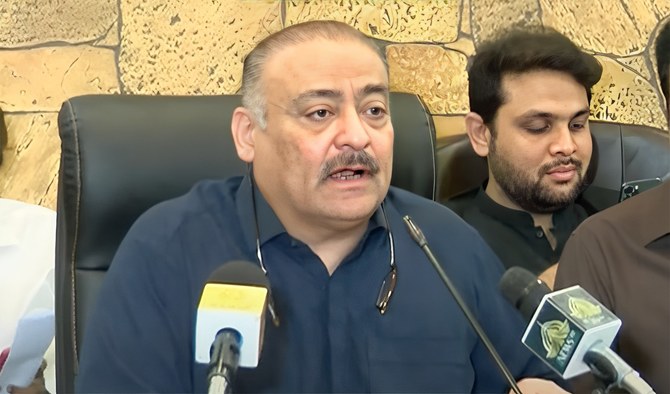ISLAMABAD: Pakistan’s health minister Abdul Qadir Patel said on Friday former prime minister Imran Khan’s mental stability was “questionable” after he shared a medical report prepared by a panel of five doctors at a leading public hospital in the federal capital.
Khan was made to undergo a medical checkup after his arrest from the Islamabad High Court by paramilitary Rangers on corruption charges earlier this month. The procedure was carried out to satisfy a legal requirement ahead of interrogation by government agencies.
The health minister informed the former prime minister’s medical examination was carried out under the supervision of five senior doctors at the Pakistan Institute of Medical Sciences (PIMS) in Islamabad.
“The report says his [Khan’s] mental stability is questionable [as] there were some inappropriate gestures,” he said while addressing a news conference in Karachi.
Patel defended the government’s decision to share the report’s findings with the public during the media talk, saying “any document is a public document in democracy.”
“His [the ex-PM’s] urine sample was [also] obtained and, according to the initial report, it contained toxic substances, including high quantities of alcohol and cocaine,” he continued.
Khan, who survived an apparent assassination attempt while leading an anti-government rally last year, said his leg was fractured by gunshot wounds. However, the health minister also questioned that claimed.
“This person had a very heavy plaster cast wrapped [around his leg] for five to six months despite his medical report showing no signs of fracture,” he said. “Tell me, if there is a wound on the skin or flesh, have you ever seen anyone wearing a plaster cast to [treat it], that too for five to six months.”
In response to a question, he said the government would also write to the Pakistan Medical and Dental Council (PMDC), a regulatory body, to summon the doctors who said Khan’s leg had fractured.
The relation between the ex-premier and the ruling coalition continues to remain bitter since the former was driven out of power in a parliamentary no-confidence vote in April last year.
Pakistan’s health minister publicizes ex-PM Khan’s medical report, calls his mental stability ‘questionable’
https://arab.news/2jdjg
Pakistan’s health minister publicizes ex-PM Khan’s medical report, calls his mental stability ‘questionable’

- Abdul Qadir Patel defends the decision to unveil the report, says ‘any document is a public document in democracy’
- Minister denied ex-PM’s claims of a fractured leg after an apparent assassination attempt targeting Khan last November
Pakistan depart for T20 World Cup while waiting for ICC reaction to India game boycott

- Pakistan shook cricketing world when their government approved participation in World Cup, but asked team to boycott India match on Feb. 15
- The ICC has said Pakistan’s ‘position of selective participation is difficult to reconcile with the fundamental premises of a global sporting event’
ISLAMABAD: Pakistan departed for the T20 World Cup in Sri Lanka on Monday and awaited any sanction from the International Cricket Council for refusing to play India in the tournament.
In video footage released by the Pakistan Cricket Board, the cricketers were dressed in their new World Cup kit as they boarded a bus from a hotel to the airport in Lahore.
India is co-hosting the World Cup but Pakistan will play all of its games in Sri Lanka — including any in the knockout stage — because of political tensions with India.
Pakistan shook the cricketing world when its government instructed the team on Sunday to compete in the World Cup but boycott the group game against India in Colombo on Feb. 15. The government did not give a reason on its X account.
The PCB has reportedly not given official notice to the ICC.
The ICC warned Pakistan there will be consequences.
The ICC said “the position of selective participation is difficult to reconcile with the fundamental premises of a global sporting event.” The ICC added Pakistan’s decision was “not in the interest of the global game or the welfare of fans worldwide, including millions in Pakistan.”
Pakistan and India have fought four wars and frequently clash on their border, so their cricket matchups often attract the highest audience and are therefore a significant source of income for broadcasters, sponsors, and the ICC.
They are regularly grouped at ICC tournaments because they have not played a bilateral cricket series for 14 years.
The T20 World Cup starts on Saturday when Pakistan is scheduled to open against the Netherlands.
Pakistan will play a final warmup game against Ireland on Wednesday in Colombo.
After Pakistan wrapped up a 3-0 Twenty20 series win over Australia on Sunday in Lahore, Pakistan captain Salman Ali Agha said he will follow the government’s instructions.
“It’s not our decision (to boycott the India game), we can’t do anything about it,” Agha said. “We will do whatever our government and the (PCB) chairman say.”
PCB chairman Mohsin Naqvi has criticized the ICC for “double standards” by refusing to shift Bangladesh’s games to Sri Lanka after the Bangladesh government didn’t allow its team to travel to India due to security concerns. The ICC axed Bangladesh and replaced it with Scotland for the tournament.
The strained political relations between India and Pakistan spilled onto the cricket field last year when India players refused to shake hands with Pakistan players during three Asia Cup games, including the final, in the United Arab Emirates. Later, India left without the trophy after it refused to accept it from Naqvi, who is the president of the Asian Cricket Council.










